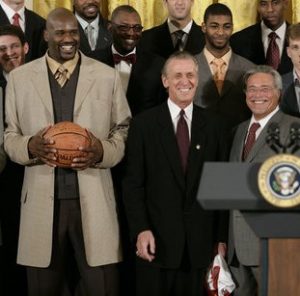
On June 19th (Juneteenth), according to the Miami Herald, in a two-minute video, the Miami Heat owner Micky Arison announced that he planned to give all of his employees Election Day off as a paid holiday. This video also featured the coach, Erik Spoelstra, and Pat Riley, Alonzo Mourning and Shane Battier, each of whom holds an executive position in the Heat organization. The video made clear that the decision to give Heat employees Election Day off was part of the Heat’s broader commitment to social justice.
Encouraging people to vote, of course, is just one of the many ways that sport can affect the social changes that are needed in our society. But in giving his employees Election Day off, Arison shows how other owners of sports franchises, even those who may be much more politically conservative than he is, can pave the way for a much-needed national effort to make it easier, not harder to vote.Owners, of course, are capitalists, and they are in the tricky position of wanting to satisfy, or at least not offend, those who root for their teams. They are in the entertainment business and they have a product to sell. As now-owner, then-player Michael Jordan memorably reminded us when he refused to endorse the liberal African American challenger to the reactionary and racist Senator Jesse Helms in his home state of North Carolina, “Republicans buy sneakers, too.”
But we believe that giving employees the day off on Election Day is low-hanging fruit for franchise owners. Even the most conservative among them, even the Trump supporters (of whom there are many), should be able to get behind making it easier for their employees to vote. Up there with mom and apple pie, what could be more American than voting?
In the long run, Congress should declare the first Tuesday in November, Election Day, a national holiday. More than 25 countries hold their elections on weekends, and in many countries, as varied as Australia, South Korea and Israel, Election Day is a national holiday (voting in Australia is compulsory, and those who don’t vote can be fined as much as $170). About a dozen states have declared Election Day a state holiday, including, in the last few months, both Virginia and Illinois, and many states give their workers time off to vote. A majority of Democrats (71%) and Republicans (59%) support having Election Day become a national holiday, but many Republicans clearly want fewer, not more, people to vote. Trump admitted what many Republicans fear: if more people were to vote, Republicans would never win. Mitch McConnell has dismissed efforts to make it easier for Americans to vote as a “power grab by Democrats.” These fears are tempered by red-state Utah, which has mail-in ballots for its voters and has seen an increase in turnout in its last three elections with no evidence of cheating, another Trumpian scare tactic.But in the short run, even without Congress, and even if the other states don’t join those that have declared Election day a state holiday, the owners of franchises can play a valuable role. Indeed, we argue that the owners could, and should, lead the way.
Many have claimed that sport and politics should somehow be separate, and that athletes should leave politics alone. They should, in the offensive comment of Fox News host Laura Ingraham, “shut up and dribble.” Or, as Kelly Loeffler, the Republican Senator from Georgia, and the co-owner of the Atlanta Dream of the WNBA put it, “Now more than ever, we should be united in our goal to remove politics from sports.” But that is nonsense. Sports never have been and never will be divorced from politics. Much of what takes place in the world of sports is so routinized that it typically is not seen as political, though in fact it is, such as playing the national anthem before games, or the military flyovers that have taken place at sports contests since 1918.Moreover, what has taken place in the world of sports has led society to some of its greatest achievements. Years before the Voting Rights Act of 1964, before Martin Luther King Jr.’s 1963 “I Have a Dream” speech, before the 1961 sit-ins in Greensboro, NC, before the 1955 bus boycott in Birmingham, Alabama, there was Jackie Robinson, in 1947, courageously integrating Major League Baseball. Robinson paved the way for society to start to see Blacks as human, even though of course his path was not without a ton of racist backlash. King said of Robinson, “Without him, I never could have done what I did.”
Jackie Robinson led the way for other athletes to challenge the status quo. Although vilified by many for the stances they took, Muhammad Ali, Curt Flood, Tommie Smith, John Carlos, Billie Jean King and Martina Navratilova are now seen as heroic figures who helped move sport, and the larger society, toward greater social justice. The pressures that women athletes, and others, put on legislators resulted in the passage in 1972 of Title IX legislation by Congress, legislation that has affected the lives of every boy and girl growing up in America.

Many current athletes have continued along this activist path. NASCAR driver Bubba Wallace, the lone Black driver in that sport, called on its leaders to ban the Confederate flag at all of its races, saying it “was a long time coming.” Two days later, they did, a stunning action for a sport steeped in Southern heritage with a substantial pro-Confederate fan base. LeBron James and Maya Moore have also stepped up, encouraging their fans to vote this November. But unlike these celebrity athletes, Mickey Arison is a boss, he has employees, and he can make sure that their jobs do not prevent them from voting. So we say good for you Mickey, and now we wait to see Mark Cuban, Michael Jordan, Stephen Ross, Bruce Sherman, Derek Jeter, Vincent Viola, and the other owners of NBA, MLB, and, who knows, maybe even the NFL franchises, do the same.
We know that what happens in the world of sports can influence legislators and it can influence those who run corporations. Those in the world of sports have shown that they can drag recalcitrant and reactionary state legislators to do the right thing. Without the pressure from the ACC and the NBA, North Carolina would still have that ridiculous bathroom law that embarrassed the state and cost its Republican Governor his job. Without the pressure from the SEC and the NCAA, Mississippi would not, finally, have removed the confederate flag from its state flag.
At stadiums around the country, they are taking down monuments of owners who fought change (George Preston Marshall of the Washington Redskins, Calvin Griffith of the Minnesota Twins, Jerry Richardson of the Carolina Panthers). Giving their employees the day off on Election Day might not lead to the erection of monuments — after all, it is only a small act that indicates that they believe people should be able to vote — but in following Micky Arison’s lead on this, the owners would be on the right side of history.So, too, can the world of sports influence corporations, and some corporations are already in. Twitter and Uber have declared that Election Days around the world will be paid company holidays. Where are the other big corporations? Tim Cook of Apple? Mary Barra of General Motors? Kenneth Frazier of Merck? Michael Kasbar of World Fuel Services? Mark Zuckerberg of Facebook?
Just as we encourage the owners to follow Arison’s lead, so, too, do we encourage corporate America to join in. The desire to maximize profits can drive change in the world of sports, and the views of fans and advertisers can have an impact, as has been seen in the forthcoming name change for Washington’s NFL franchise.
So we say kudos to Mickey Arison: his decision to give his employees the day off on Election Day is but one small step, but we believe it is one that could lead the way for other franchise owners, and corporations, to do the right thing.
Recommended Reading
Bryant, Howard. (2018). The Heritage: Black Athletes, A Divided America, and the Politics of Patriotism. Beacon Press.
Carrington, Ben. (2010) Race, Sport and Politics: The Sporting Black Diaspora. Sage Publications.
Hartmann, Doug. (2003). Race, Culture, and the Revolt of the Black Athlete: The 1968 Olympic Protests and their Aftermath. The University of Chicago Press.
Rhoden, William C. (2010). Forty Million Dollar Slaves: The Rise, Fall, and Redemption of the Black Athlete. Crown.
Ware, Susan. (2011). Game, Set, Match: Billie Jean King and the Revolution in Women’s Sports. University of North Carolina Press.
Zirin, Dave. (2008). A People’s History of Sports in the United States: 250 Years of Politics, Protest, People and Play. The New Press.
